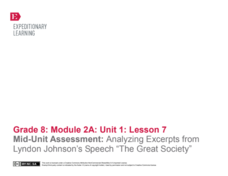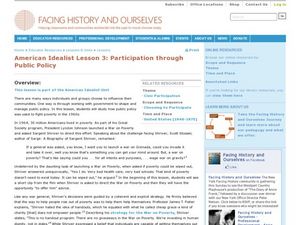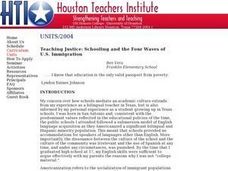Curated OER
The New Frontier and the Great Society
In this 1960s American history worksheet, students identify the 7 terms that best match 7 descriptions, eliminate 3 false statements, and identify 2 historical themes pertaining to Kennedy's new frontier and Johnson's Great Society.
EngageNY
Mid-Unit Assessment: Analyzing Excerpts from Lyndon Johnson’s Speech “The Great Society”
Time for intermission! Scholars take an intermission break from learning in the unit to work on a mid-unit assessment independently. Readers answer questions about Lyndon Johnson's Speech "The Great Society" to demonstrate the knowledge...
Curated OER
The Great Society and A Thousand Points of Lights
Students compare 2 preseidental speeches. In this presidential agenda lesson, students compare and contrast a Lyndon B. Johnson speech with a George H. W. Bush Speech.
Curated OER
American Idealist Lesson 3: Participation through Public Policy
Students explore America's War on Poverty. In this American history lesson, students research the work of Sergeant Shriver regarding poverty during the Johnson administration. Students share their research finding in an essay or oral...
Curated OER
Confucianism in a Changing Society
A great lesson plan promotes thoughtful discussion, global perspectives, and links between economics and culture. Learners view four clips showing how Confucian teachings have shaped Chinese culture and how filial piety plays a role in...
Curated OER
Gulf of Tonkin Resolution
Students analyze the Gulf of Tonkin Resolution. They read the background to the Vietnam War and the social, political, and miliary issues surrounding the War and how they affected President Lyndon B. Johnson's Great Society Program. ...
Curated OER
Lyndon Baines Johnson : Triumph and Tragedy
Students view a documentary on Lyndon Baines Johnson. His presidency was both a success and a failure. After viewing, students discuss what they saw then create a poster for LBJ's 1964 presidential campaign. They discuss Vietnam as well.
Curated OER
The foreign and domestic policies of Lyndon B. Johnson
Eleventh graders study and evaluate the successes and failures of LBJ's domestic and foreign policies. They formulate historical questions and defend findings based on inquiry and interpretation. Each student identifies, analyzes and...
Curated OER
Cold War Conflict in Vietnam: The Vietnam-Era Presidency
Comparing and evaluating various media types is a great way to build critical analysis skills. Learners read about the Vietnam era presidency, specifically the foreign policy established by Johnson and Nixon. Then they compare several...
John F. Kennedy Presidential Library & Museum
Analyzing the Inaugural Address
Get high school historians to step outside their own shoes by responding to JFK's inaugural address from the perspective of a civil rights activist, a soviet diplomat, or a Cuban exile. After a class discussion about the address,...
Curated OER
Teaching Justice: Schooling and the Four Waves of U.S. Immigration
U.S. immigration is the focus of a unit on social justice. Over the course of a school year, young historians read a variety of texts to learn about four waves of immigration that have occurred over time in the U.S. An emphasis on...
Curated OER
Who’s Got Rights? An Introduction to Human Rights and Human Rights Defenders
Students explore human rights issues. In this social justice lesson, students examine human rights as they read segments of the "Universal Declaration of Human Rights," discuss photographs with human rights implications, and play a human...
Stanford University
Sheg: Document Based History: Reading Like a Historian: Great Society
[Free Registration/Login Required] Lyndon Johnson's Great Society programs, i.e., Medicare and Medicaid, were created in the 1960's to curb poverty and racism. This lesson offers learners the opportunity to read about the programs and...
US National Archives
National Archives: Congress, the Great Society, and Today
Students will study the Great Society and the role Congress played in shaping it. This lesson plan focuses on small group research to draw conclusions on the historical significance of each aspect of The Great Society Congress. Sources...













